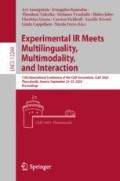Abstract
Ground-truth creation is one of the most demanding activities in terms of time, effort, and resources needed for creating an experimental collection. For this reason, crowdsourcing has emerged as a viable option to reduce the costs and time invested in it.
An effective assessor merging methodology is crucial to guarantee a good ground-truth quality. The classical approach involve the aggregation of labels from multiple assessors using some voting and/or classification methods. Recently, Assessor-driven Weighted Averages for Retrieval Evaluation (AWARE) has been proposed as an unsupervised alternative, which optimizes the final evaluation measure, rather than the labels, computed from multiple judgments.
In this paper, we propose s-AWARE, a supervised version of AWARE. We tested s-AWARE against a range of state-of-the-art methods and the unsupervised AWARE on several TREC collections. We analysed how the performance of these methods changes by increasing assessors’ judgement sparsity, highlighting that s-AWARE is an effective approach in a real scenario.
Access this chapter
Tax calculation will be finalised at checkout
Purchases are for personal use only
Notes
- 1.
The original AWARE methodology considered additional ways to quantify “closeness”, i.e. Frobenious norm, Kullback-Leibler Divergence (KLD), and AP Correlation (APC). Here, we focus on the two approaches which produced the best and most stable results across different configurations.
References
Allan, J., Harman, D.K., Kanoulas, E., Li, D., Van Gysel, C., Voorhees, E.M.: TREC 2017 common core track overview. In: Voorhees, E.M., Ellis, A. (eds.) Proceedings of The Twenty-Sixth Text REtrieval Conference (TREC 2017). National Institute of Standards and Technology (NIST), Special Publication 500-324, Washington, USA (2018)
Alonso, O.: The Practice of Crowdsourcing. Morgan & Claypool Publishers, San Rafael (2019)
Alonso, O., Mizzaro, S.: Using crowdsourcing for TREC relevance assessment. Inf. Process. Manag. 48(6), 1053–1066 (2012). https://doi.org/10.1016/j.ipm.2012.01.004. ISSN 0306-4573
Clough, P., Sanderson, M., Tang, J., Gollins, T., Warner, A.: Examining the limits of crowdsourcing for relevance assessment. IEEE Internet Comput. 17(4), 32–38 (2013). https://doi.org/10.1109/mic.2012.95
Ferrante, M., Ferro, N., Maistro, M.: AWARE: exploiting evaluation measures to combine multiple assessors. ACM Trans. Inf. Syst. 36(2), 1–38 (2017). https://doi.org/10.1145/3110217
Georgescu, M., Zhu, X.: Aggregation of crowdsourced labels based on worker history. In: Proceedings of the 4th International Conference on Web Intelligence, Mining and Semantics (WIMS 2014). ACM, New York (2014). https://doi.org/10.1145/2611040.2611074. ISBN 9781450325387
Hosseini, M., Cox, I.J., Milić-Frayling, N., Kazai, G., Vinay, V.: On aggregating labels from multiple crowd workers to infer relevance of documents. In: Baeza-Yates, R., et al. (eds.) ECIR 2012. LNCS, vol. 7224, pp. 182–194. Springer, Heidelberg (2012). https://doi.org/10.1007/978-3-642-28997-2_16
Inel, O., et al.: Studying topical relevance with evidence-based crowdsourcing. In: Cuzzocrea, A., et al. (eds.) Proceedings of 27th International Conference on Information and Knowledge Management (CIKM 2018), pp. 1253–1262. ACM Press, New York (2018)
Nellapati, R., Peerreddy, S., Singhal, P.: Skierarchy: Extending the power of crowdsourcing using a hierarchy of domain experts, crowd and machine learning. In: Proceedings of the TREC 2012 Crowdsourcing Track, pp. 1–11 (2012)
Sanderson, M.: Test collection based evaluation of information retrieval systems. Found. Trends Inf. Retr. (FnTIR) 4(4), 247–375 (2010)
Smucker, M.D., Kazai, G., Lease, M.: Overview of the TREC 2012 crowdsourcing track. In: Voorhees, E.M., Buckland, L.P. (eds.) Proceedings of The Twenty-First Text REtrieval Conference (TREC 2012). National Institute of Standards and Technology (NIST), Special Publication 500-298, Washington, USA (2013)
Tang, W., Lease, M.: Semi-supervised consensus labeling for crowdsourcing. In: Proceedings of the SIGIR 2011 Workshop on Crowdsourcing for Information Retrieval (CIR), pp. 36–41. ACM, New York (2011). ISBN 9781450325387
Tao, D., Cheng, J., Yu, Z., Yue, K., Wang, L.: Domain-weighted majority voting for crowdsourcing. IEEE Trans. Neural Netw. Learn. Syst. 30(1), 163–174 (2019). https://doi.org/10.1109/tnnls.2018.2836969
Tian, T., Zhu, J., Qiaoben, Y.: Max-margin majority voting for learning from crowds. IEEE Trans. Pattern Anal. Mach. Intell. 41(10), 2480–2494 (2019). https://doi.org/10.1109/tpami.2018.2860987
Voorhees, E.M.: Overview of the TREC 2004 robust track. In: Voorhees, E.M., Buckland, L.P. (eds.) Proceedings of The Thirteenth Text REtrieval Conference (TREC 2004). National Institute of Standards and Technology (NIST), Special Publication 500-261, Washington, USA (2004)
Voorhees, E.M., Harman, D.K.: Overview of the eigth Text REtrieval Conference (TREC-8). In: Voorhees, E.M., Harman, D.K. (eds.) Proceedings of The Eighth Text REtrieval Conference (TREC-8), pp. 1–24. National Institute of Standards and Technology (NIST), Special Publication 500-246, Washington, USA (1999)
Whiting, S., Perez, J., Zuccon, G., Leelanupab, T., Jose, J.: University of Glasgow (qirdcsuog) at TREC crowdsourcing 2001: TurkRank - network based worker ranking in crowdsourcing. In: Proceedings of The Twentieth Text REtrieval Conference, TREC 2011, Gaithersburg, Maryland, USA, 15–18 November 2011, pp. 1–7, January 2011
Yilmaz, E., Aslam, J.A., Robertson, S.E.: A new rank correlation coefficient for information retrieval. In: Chua, T.S., Leong, M.K., Oard, D.W., Sebastiani, F. (eds.) Proceedings of 31st Annual International ACM SIGIR Conference on Research and Development in Information Retrieval (SIGIR 2008), pp. 587–594. ACM Press, New York, USA (2008)
Author information
Authors and Affiliations
Corresponding author
Editor information
Editors and Affiliations
Rights and permissions
Copyright information
© 2020 Springer Nature Switzerland AG
About this paper
Cite this paper
Ferrante, M., Ferro, N., Piazzon, L. (2020). s-AWARE: Supervised Measure-Based Methods for Crowd-Assessors Combination. In: Arampatzis, A., et al. Experimental IR Meets Multilinguality, Multimodality, and Interaction. CLEF 2020. Lecture Notes in Computer Science(), vol 12260. Springer, Cham. https://doi.org/10.1007/978-3-030-58219-7_2
Download citation
DOI: https://doi.org/10.1007/978-3-030-58219-7_2
Published:
Publisher Name: Springer, Cham
Print ISBN: 978-3-030-58218-0
Online ISBN: 978-3-030-58219-7
eBook Packages: Computer ScienceComputer Science (R0)

